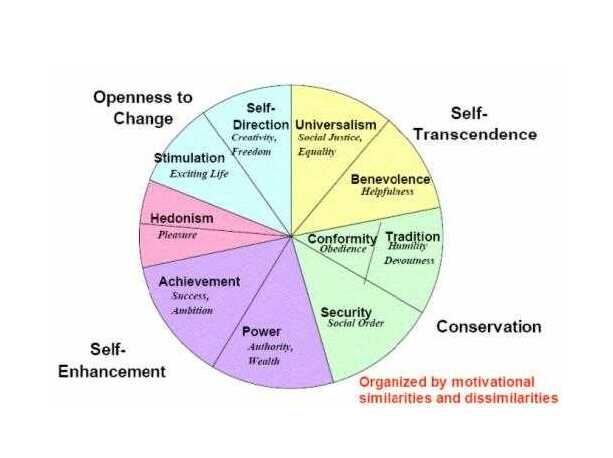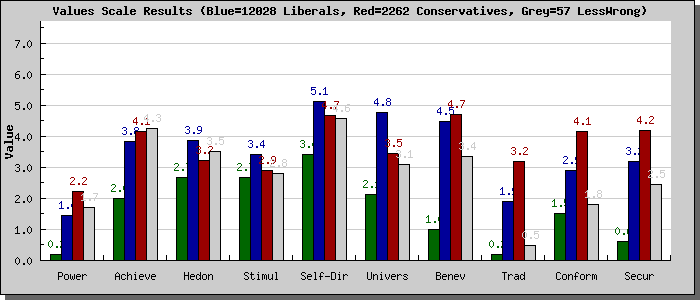|
The scale you completed was the "Schwartz Value Survey," created by Shalom Schwartz at Hebrew University, Israel.
The scale measures the degree to which you value each of
ten domains that Schwartz has found across many cultures. Values are
defined as "desirable, trans-situational goals, varying in importance,
that serve as guiding principles in people's lives."
The idea behind the scale is that there is an internal
order and structure to values. Using various statistical techniques,
Schwartz has found that the ten basic human values show a pattern of
relationships that can be graphed as a circle (see below). Values that
are next to each other are closely related; values that are across from
each other tend to be opposed, or tend not to be strongly endorsed by
the same person. Political liberals have been found to endorse the
"openness to change" values, while conservatives are more likely to
endorse the "conservation" values. We have put this scale up on
Yourmorals.org because we are interested in learning how Schwartz's ten
values (which include moral and non-moral values) relate to the "five
foundations of morality" theory from Haidt and Graham, as measured by
the "Moral Foundations Questionnaire."

The values are described by Schwartz as follows:
POWER: Social status and prestige, control or dominance over people and resources
ACHIEVEMENT: Personal success through demonstrating competence according to social standards
HEDONISM: Pleasure or sensuous gratification for oneself
STIMULATION: Excitement, novelty, and challenge in life
SELF-DIRECTION: Independent thought and action - choosing, creating, exploring
UNIVERSALISM: Understanding, appreciation, tolerance, and protection for the welfare of all people and for nature
BENEVOLENCE: Preservation and enhancement of the welfare of people with whom one is in frequent personal contact
TRADITION: Respect, commitment, and acceptance of the customs and ideas that traditional culture or religion provide
CONFORMITY: Restraint of actions, inclinations, and impulses likely to
upset or harm others and violate social expectations or norms
SECURITY: Safety, harmony, and stability of society, of relationships, and of self
The figure below shows your averages (in green) compared to the average scores of liberals (in blue) and the average scores of conservatives (in red).
You are a member of the group:LessWrong and those results are shown with the Grey bar.
To learn more, you can read this paper.
As well, here is another relevant academic article.
Schwartz, S.H. (1992). Universals in the content and structure of
values: Theoretical advances and empirical tests in 20 countries.
Advances in Experimental Social Psychology, M. Zanna, San Diego:
Academic Press.
|

